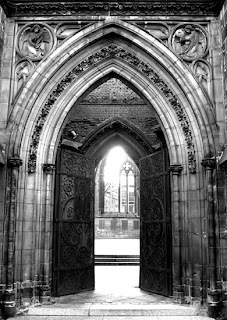“I read
the Bible, but I forgot the verses
The
liquor store is open later than the church is”
- Macklemore,
"Neon Cathedral"
“Our doors are locked all but
four hours a week. If our neighbors think about our church at all, it must be
as a place where dressed-up people gather to do... who knows what?”
- removed from my report to
University Church regarding Outreach ministries
“We don’t want to offend
anyone. Let’s take it out.”
I tried to argue for a bit. I mentioned that some others who read the draft had specifically mentioned that they found the sentence powerful. “More to the point,” I said, “this is not even an insulting statement; I’m just trying to be frank here.” And that is where I shut myself up.
As I spoke those words, I
realized: to some of the powerful members of an upper-middle-class, white
church situated in a poor, predominantly black neighborhood, the truth,
frankly-stated, is itself offensive.
I don’t want to characterize my
church unfairly. I believe the Holy Spirit is moving there: they are highly
committed to social justice (and more so every day), and their hospitality to
me has gone far beyond ordinary politeness. If I thought they were committing a
heinous or unique sin, I wouldn’t bother to blog about it. Frankly, though,
this “institutional blind spot”, represented in thousands of churches, contributes
to the alienation of huge groups of people and, for some of these churches,
their own demise.
To be clear, the blind spot I’m
referring to is not necessarily the fact that people dress up on Sunday
morning. I have no feelings about that one way or the other; every group of
people follows norms that newcomers don’t expect or understand. What I take
issue with is the fact that churches evaluate themselves on all sorts of
scales, statistics, surveys, and checklists, but they rarely evaluate themselves
from the perspective of the poor.
More importantly, churches
sometimes evaluate their institutions from the perspective of the poor.
Or they’ll demonstrate “Point #5 of our Strategic Mission: Commitment to Social
Justice” by doing a Service Project once a month. But the people? They are
afraid to look in the mirror, loath to ask themselves, “How do I welcome
the poor into my church and my life?”
 Once, a woman asked me with
wide eyes, “Why don’t the young families come to church anymore? How come
church is no longer their place to connect with other people?” A few weeks
later she said to me, “I like to entertain people, but I can’t just throw open
my home to the whole church any more. Some people - like [one of the poor
single mothers in our congregation] - I’m just not comfortable around.” I still
wonder if I should have confronted her about it.
Once, a woman asked me with
wide eyes, “Why don’t the young families come to church anymore? How come
church is no longer their place to connect with other people?” A few weeks
later she said to me, “I like to entertain people, but I can’t just throw open
my home to the whole church any more. Some people - like [one of the poor
single mothers in our congregation] - I’m just not comfortable around.” I still
wonder if I should have confronted her about it.
Last week, I helped another
coffee-shop-church in our neighborhood distribute flyers about a block party.
Kind as they are to sponsor a neighborhood event, I wonder which of these poor
people they expect to join a church that meets in a place of business where
everyone else around the table cradles coffee at $2 a pop. They eschew sermons
in favor of conversations, vaguely referring to God once in a while, in an effort
to attract millenials and postmoderns. I wonder how many of these conversations
revolve around matters with any connection to life in Syracuse’s Near East
Side.
The thing about all this is, I
care about the old people who love dressing up and listening to organ music. I
care about millenials and postmoderns. And I care about the people of the Near
East Side. Am I supposed to choose one group to belong to or minister to? If
being “missional” means reinventing “church” and tailoring it to the tastes of
any particular segment of society, it seems impossible to ever bring the
college students together with the lifelong welfare recipients in this
neighborhood.
I admire the missional movement
and the coffee-shop-church, the desire to go out instead of holing up
and daring others to come in. My church needs more of that. My church needs to
at least unlock the doors more often. But sometimes, we get so caught up in
movements that reimagine how we do ministry, we can lose sight of what
we’re doing and whom we’re here for.
I do not know the answers to
all this, but I do know one thing that law students and welfare recipients have
in common: they are human, and we humans are desperate to be loved. We need to
belong. We just want someone to take an interest in us and our well-being.
 We know when someone
only wants to collect our tithe, or add us to their Sunday school tally, or
give us food so we’ll go away; but we also know when someone genuinely cares
for us. And when we meet that person to whom we finally matter, it turns
out we don’t really care how they’re dressed or what they look like or whether
their organization implements a cool graphic design strategy.
We know when someone
only wants to collect our tithe, or add us to their Sunday school tally, or
give us food so we’ll go away; but we also know when someone genuinely cares
for us. And when we meet that person to whom we finally matter, it turns
out we don’t really care how they’re dressed or what they look like or whether
their organization implements a cool graphic design strategy.
I hope we learn to just love
people, even if we’re afraid that they’re too dirty for us or that we’re not
cool enough for them. May we ask God to reveal God’s love for every person to
our own hearts, that we might reveal it all over again to them.
May we emerge from our
self-imposed loneliness and open the doors even to those who might mistake us for
a liquor store, that we may encounter new facets of that love every terrifying
new day.
Lyndsey
lives and works in Syracuse, NY. She majored in theology at Lee
University, which is like eating cake or listening to thunderstorms -
too enjoyable to be called work. Also, no one will pay you to do it. You can follow her on Twitter @lyndseygraves and you can find more of her writing at her blog To Be Honest.
You can follow On Pop Theology on Twitter @OnPopTheology or like us on Facebook at www.facebook.com/OnPopTheology.
You might also like:
You can follow On Pop Theology on Twitter @OnPopTheology or like us on Facebook at www.facebook.com/OnPopTheology.
You might also like:
- The Day I Was Called a Demon
- Because It's Not My Tragedy
- Let's All Talk About What We're Tired Of (A Response to Tony Jones)


No comments:
Post a Comment